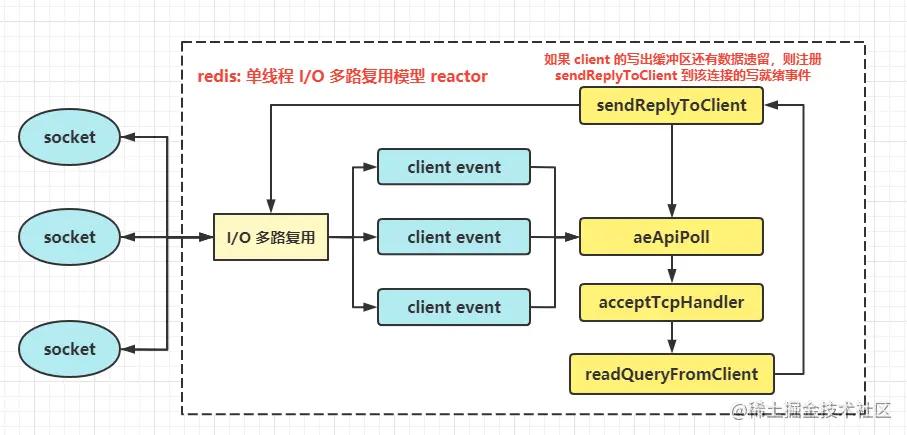Redis learning talks about the single-threaded reactor model
This article will talk about the single-threaded reactor model, I/O model, and multi-threaded I/O model in Redis. I hope it will be helpful to you!

High performance of redis
- Pure memory access, all data is in memory, and all operations are For memory-level operations, the memory response time is at the nanosecond level. Therefore, the CPU of the redis process basically does not have disk I/O waiting time and memory read and write performance problems. The CPU is not the bottleneck of redis (memory size and network I/O are the bottleneck of redis, that is, the gap between the client and the server. network transmission delay). [Related recommendations: Redis Video Tutorial]
- adopts a single-thread model, and single-thread implementation is simple. Avoids the overhead caused by frequent context switching of multiple threads and synchronization mechanisms such as locks
- Simple and efficient basic data structures: dynamic strings (SDS), linked lists, dictionaries, jump linked lists, integer sets and compressed lists. Then redis uses this basis to implement objects that users can operate: strings, lists, hashes, sets, ordered sets and other objects
- reactor mode network event processor. It uses I/O multiplexing to monitor multiple sockets at the same time, which is an efficient I/O model. For reactor-related knowledge, you can read this articleFramework: See the Linux high-performance network IO Reactor model
Why use single thread
- Uses a single thread to avoid unnecessary context switching and competition conditions; there is no switching caused by multiple threads that consumes the CPU
- There is no need to consider various lock issues, and there is no locking and releasing There is no performance consumption due to possible deadlocks in lock operations. It is simple and maintainable. Multi-thread mode will make program writing more complex and troublesome. Single-thread implementation is easy to implement.
We often say that redis is single-threaded because its network event processing model reactor is single-threaded
- If a client request deletes millions of key values, then this The command may cause blocking. In redis 4.0, we chose to introduce multi-threading to implement this type of non-blocking commands
- In the redis6.0 version, multi-threading was officially introduced to process the client's I/O read and write responses, while the processing of redis command events is still in Main thread single-line processing
- If it is for the entire redis system, there will always be other threads to process asynchronous tasks, such as AOF and RDB synchronization
redis is fast in processing, not only because it is a single-threaded pure memory system, but also because it adopts the Reactor model and uses I/O multiplexing to process external requests. , Reduce network connection, read and write waiting time. Enable it to handle a large number of client requests concurrently in network I/O operations, achieving high throughput and high concurrency


The above is the detailed content of Redis learning talks about the single-threaded reactor model. For more information, please follow other related articles on the PHP Chinese website!

Hot AI Tools

Undresser.AI Undress
AI-powered app for creating realistic nude photos

AI Clothes Remover
Online AI tool for removing clothes from photos.

Undress AI Tool
Undress images for free

Clothoff.io
AI clothes remover

AI Hentai Generator
Generate AI Hentai for free.

Hot Article

Hot Tools

Notepad++7.3.1
Easy-to-use and free code editor

SublimeText3 Chinese version
Chinese version, very easy to use

Zend Studio 13.0.1
Powerful PHP integrated development environment

Dreamweaver CS6
Visual web development tools

SublimeText3 Mac version
God-level code editing software (SublimeText3)

Hot Topics
 1382
1382
 52
52
 How to build the redis cluster mode
Apr 10, 2025 pm 10:15 PM
How to build the redis cluster mode
Apr 10, 2025 pm 10:15 PM
Redis cluster mode deploys Redis instances to multiple servers through sharding, improving scalability and availability. The construction steps are as follows: Create odd Redis instances with different ports; Create 3 sentinel instances, monitor Redis instances and failover; configure sentinel configuration files, add monitoring Redis instance information and failover settings; configure Redis instance configuration files, enable cluster mode and specify the cluster information file path; create nodes.conf file, containing information of each Redis instance; start the cluster, execute the create command to create a cluster and specify the number of replicas; log in to the cluster to execute the CLUSTER INFO command to verify the cluster status; make
 How to clear redis data
Apr 10, 2025 pm 10:06 PM
How to clear redis data
Apr 10, 2025 pm 10:06 PM
How to clear Redis data: Use the FLUSHALL command to clear all key values. Use the FLUSHDB command to clear the key value of the currently selected database. Use SELECT to switch databases, and then use FLUSHDB to clear multiple databases. Use the DEL command to delete a specific key. Use the redis-cli tool to clear the data.
 How to use the redis command
Apr 10, 2025 pm 08:45 PM
How to use the redis command
Apr 10, 2025 pm 08:45 PM
Using the Redis directive requires the following steps: Open the Redis client. Enter the command (verb key value). Provides the required parameters (varies from instruction to instruction). Press Enter to execute the command. Redis returns a response indicating the result of the operation (usually OK or -ERR).
 How to read redis queue
Apr 10, 2025 pm 10:12 PM
How to read redis queue
Apr 10, 2025 pm 10:12 PM
To read a queue from Redis, you need to get the queue name, read the elements using the LPOP command, and process the empty queue. The specific steps are as follows: Get the queue name: name it with the prefix of "queue:" such as "queue:my-queue". Use the LPOP command: Eject the element from the head of the queue and return its value, such as LPOP queue:my-queue. Processing empty queues: If the queue is empty, LPOP returns nil, and you can check whether the queue exists before reading the element.
 How to use single threaded redis
Apr 10, 2025 pm 07:12 PM
How to use single threaded redis
Apr 10, 2025 pm 07:12 PM
Redis uses a single threaded architecture to provide high performance, simplicity, and consistency. It utilizes I/O multiplexing, event loops, non-blocking I/O, and shared memory to improve concurrency, but with limitations of concurrency limitations, single point of failure, and unsuitable for write-intensive workloads.
 How to use redis lock
Apr 10, 2025 pm 08:39 PM
How to use redis lock
Apr 10, 2025 pm 08:39 PM
Using Redis to lock operations requires obtaining the lock through the SETNX command, and then using the EXPIRE command to set the expiration time. The specific steps are: (1) Use the SETNX command to try to set a key-value pair; (2) Use the EXPIRE command to set the expiration time for the lock; (3) Use the DEL command to delete the lock when the lock is no longer needed.
 How to read the source code of redis
Apr 10, 2025 pm 08:27 PM
How to read the source code of redis
Apr 10, 2025 pm 08:27 PM
The best way to understand Redis source code is to go step by step: get familiar with the basics of Redis. Select a specific module or function as the starting point. Start with the entry point of the module or function and view the code line by line. View the code through the function call chain. Be familiar with the underlying data structures used by Redis. Identify the algorithm used by Redis.
 How to make message middleware for redis
Apr 10, 2025 pm 07:51 PM
How to make message middleware for redis
Apr 10, 2025 pm 07:51 PM
Redis, as a message middleware, supports production-consumption models, can persist messages and ensure reliable delivery. Using Redis as the message middleware enables low latency, reliable and scalable messaging.




